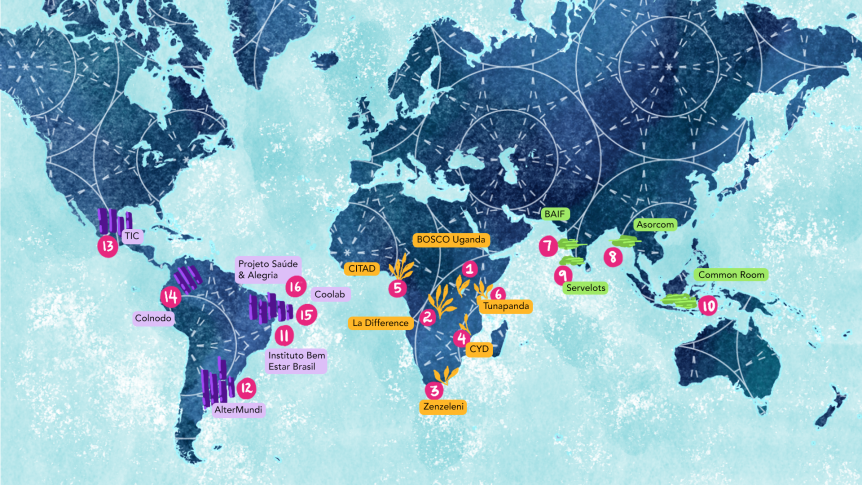
The COVID-19 pandemic and political setbacks at the country level posed multi-layered obstacles for the community network movement over the past year. Yet at the same time, within this challenging scenario, numerous community networks took the time to reflect and take specific, locally driven actions within their communities. This experience highlighted the importance of these initiatives to promote connectivity and to weave socio-technical networks that take local needs into consideration and help ensure the protection of human rights.
From 27 to 30 July, representatives from 16 organisations working with community network projects in Asia, Africa and Latin America joined together for an online convening organised by the Local Networks (LocNet) initiative, led by APC in partnership with Rhizomatica, to discuss challenges, learnings and achievements.
As the participating organisations shared their diverse lived realities and experiences, together they showed that despite all the challenges, this remains a vibrant and evolving field, capable of adapting to bring a human-centred approach and diversify the support offered for communities around the world. The multiple experience shared also underlined the importance of the community focus to promote access, especially when connected to other fundamental rights, such as education, communication, gender equality and health.
Some highlights of the encounter were beautifully captured in this graphic recording by Sonaksha Iyengar and in the one below:

Resources from the convening
Some of the sessions during the four-day convening were public, and many other community network builders engaged in online dialogue on topics of regional significance and from a technical trends perspective.
On 28 July, the convening participants followed the first session of the Virtual Summit on Community Networks in Africa season 2021/2022, which discussed tools and resources to navigate the stages and processes needed to set up and operate a sustainable community network. A video of the session is available here.
On the same day, Latin American participants from different countries came together to discuss how to create community networks. They took part in three sessions, each addressing a different theme: reasons to build community networks, infrastructure and deployment aspects, and ways to ensure the sustainability of a community network. All of the sessions were public and the recordings (in Spanish) can be found here.
The participants from Asia also took part in a regional gathering to share their experiences during three sessions, focusing on the challenges posed by the pandemic, the needs at the community level, and policy gaps. The highlights of these sessions were documented visually (find the documentation here, here and below).

On 29 July, a "lightning talk” session about community networks technology gathered people from around the world who engage in community network activities to discuss technology-related trends in the field. The recording is available here. It is also possible to find out more and join the post-event conversation on this thread.
About the Local Networks initiative
Local Networks (LocNet) is an initiative led by APC in partnership with Rhizomatica that aims to directly support the work of community networks and to contribute to an enabling ecosystem for the emergence and growth of community-based connectivity activities in developing countries.
This convening formed part of two projects currently being implemented within the LocNet initiative, “Connecting the unconnected: Supporting community networks and other community-based connectivity initiatives” and “Supporting Community-led Approaches to Addressing the Digital Divide”. It gathered representatives from 16 community network organisations from Africa, Asia and Latin America that have been selected and granted funding towards activities that create and foster a peer learning community.
Africa:
- BOSCO Uganda (Uganda)
- Centre for Information Technology and Development (CITAD) (Nigeria)
- Centre for Youth and Development (CYD) (Malawi)
- La Différence (Democratic Republic of Congo)
- Tunapanda Institute (Kenya)
- Zenzeleni (South Africa)
Asia:
- Alternative Solutions for Rural Communities (ASORCOM) (Myanmar)
- BAIF (India)
- Common Room Networks Foundation (Indonesia)
- Servelots (India)
Latin America:
- AlterMundi (Argentina)
- Colnodo (Colombia)
- Coolab (Brazil)
- Instituto Bem Estar (Brazil)
- Telecomunicaciones Indígenas Comunitarias, A. C. (TIC AC) (Mexico)
- Projeto Saúde & Alegria (Brazil).